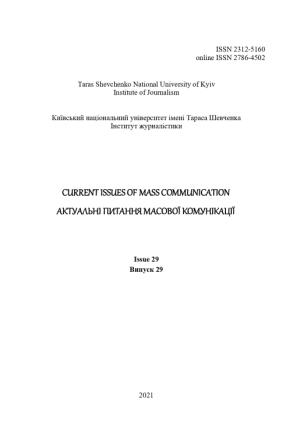«Communicative Code» and «Cultural Consumerism» in a Media Discourse
«Communicative Code» and «Cultural Consumerism» in a Media Discourse
Author(s): Bogdana NosovaSubject(s): Media studies, Recent History (1900 till today), Politics and communication, Theory of Communication, Film / Cinema / Cinematography
Published by: Інститут журналістики Київського національного університету імені Тараса Шевченка
Keywords: discourse; communication; communicative code; communicative memory; leader;
Summary/Abstract: The article considers the problems of cognitive convergence of communication and media studies within the system of values and moral imperatives of Ukrainian identity. The themes «communicative code» and «cultural consumption», presented in the works of historian N. Yakovenko and philosopher J. Habermas, are intellectual meanings. They served as theoretical markers upon which the further research draws. N. Yakovenko defined the communicative code and its connection with cultural memory. She believes that the media play a leading role in the emergence of communication codes today. Habermas’s living philosophy interprets topical issues of journalism and communication. His philosophical paradigm is close to the tasks solved by media and communication. The study’s aim is to show how the intellectual meanings generated by historians, philosophers, and writers in synergy with journalism and communication studies are further updated, while considering modern media discourse. The tasks arising from the outlined aim have been solved through the interpretation of the synergistic circles of J. Habermas, D. McQuail, N. Yakovenko, V. Kulyk, and G. Pocheptsov. Their theoretical reflections and media handlings and communication constructs of complex cultural projects, restoring the national identity. In this study a method of comparative analysis was used for tracing communicative ideas, their theoretical formation and manifestation in media texts. The method of generalization was used for conclusions. The newspaper «Day», the online newspaper «Ukrayinska Pravda», the magazine «The Ukrainian Week» and its online version among Ukrainian media most often appeal to the philosophers and philosophy. From our point of view J. Habermas warns in his scientific conclusions’ successors from mistakes in the development of civil society, which will be formed in the innovative digital environment. Our conclusion will be following: for a high-quality training of specialists in journalism and communication, it is necessary to deepen their intellectual potential. The creation of a new universal learning platform for students who have chosen journalism and social communications should be based on knowledge of politics and morality, on the ability to form the worldview assessments. This is a response to the challenge of time: to join the formation of a new type of elite, the demand for which dominates in Ukrainian society at the beginning of the 21st century.
Journal: Актуальні питання масової комунікації
- Issue Year: 2021
- Issue No: 29
- Page Range: 25-38
- Page Count: 14
- Language: Ukrainian

